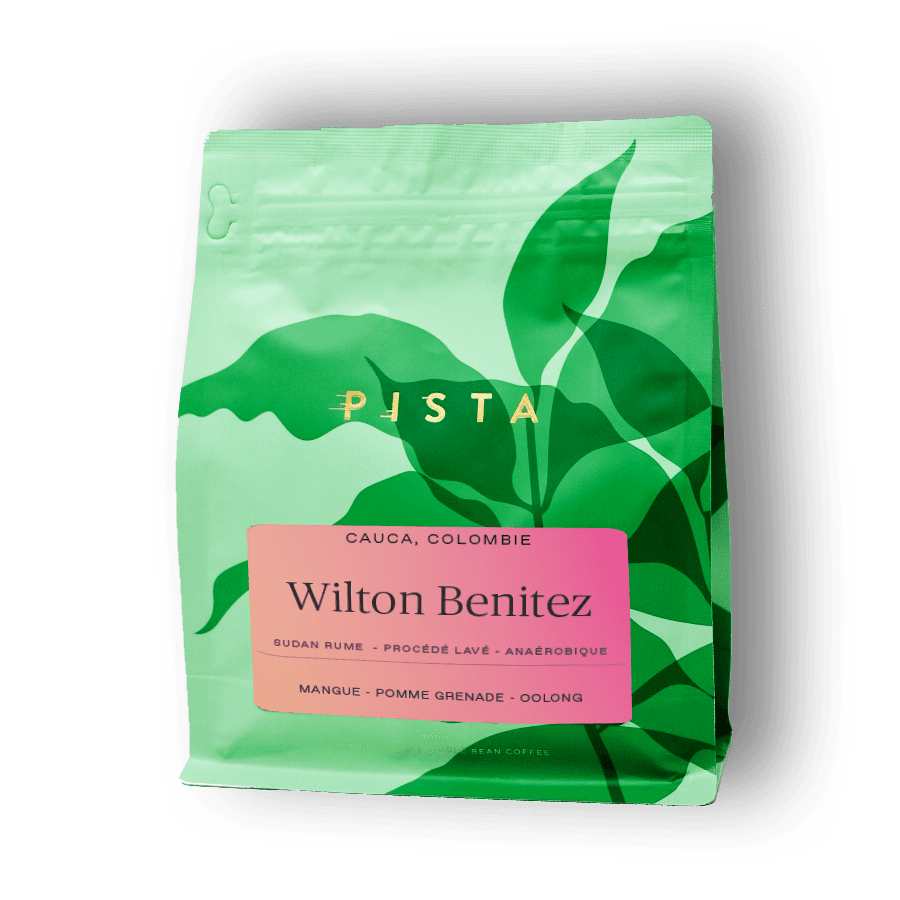Th3rdwave Directories
Cafés
Roasters
Coffees
Guides
Awards
Th3rdwave Coffee Club
Subscription
Gift subscription
Current edition
Past editions
Shop
Advent Calendar
Coffee games
Th3rdwave Wallet
Loyalty cards
Gift cards
Th3rdwave for cafés
Th3rdwave for roasters
Get free coffee
Wilton Benitez
Once again, second on the Pista menu, we find a flavor bomb from producer Wilton Benitez. Growing coffee for over 26 years and with over 16 years of experience in specialty coffee, Granja Paraíso 92 is an innovative family farm that uses modern agricultural systems to produce unique coffees. It has a processing unit, a microbiology laboratory and a quality laboratory. The use of specific bioreactors and microorganisms for controlled fermentation, as well as precise monitoring of factors like temperature, pH, Brix degrees and electrical conductivity, gives their coffees a distinctive character and unique quality. This time we present to you the Sudan Rume variety. It is a unique variety native to the Boma plateau, Sudan. For this batch, the cherries are immersed in water at 90°C for 120 seconds causing a thermal shock. The cherry is then pulped and the grains placed in an anaerobic bioreactor to begin fermentation. The coffee is subsequently disinfected by injecting ozonated water. Yeast (Saccharomyces pastorianus) is added, then fermentation is carefully monitored and lasts 96 hours. Once fermentation is complete, the coffee is dried at 38°C.
Once again, second on the Pista menu, we find a flavor bomb from producer Wilton Benitez. Growing coffee for over 26 years and with over 16 years of experience in specialty coffee, Granja Paraíso 92 is an innovative family farm that uses modern agricultural systems to produce unique coffees. It has a processing unit, a microbiology laboratory and a quality laboratory. The use of specific bioreactors and microorganisms for controlled fermentation, as well as precise monitoring of factors like temperature, pH, Brix degrees and electrical conductivity, gives their coffees a distinctive character and unique quality. This time we present to you the Sudan Rume variety. It is a unique variety native to the Boma plateau, Sudan. For this batch, the cherries are immersed in water at 90°C for 120 seconds causing a thermal shock. The cherry is then pulped and the grains placed in an anaerobic bioreactor to begin fermentation. The coffee is subsequently disinfected by injecting ozonated water. Yeast (Saccharomyces pastorianus) is added, then fermentation is carefully monitored and lasts 96 hours. Once fermentation is complete, the coffee is dried at 38°C.
Coffee origin
Country
Colombia
Region
Cauca
Variety
Rume Sudan
Farm
Granja Paraíso 92
Producer
Wilton Benitez
Process
anaerobic washed
Tastes like
🥭
mango
🌺
pomegranate
🍵
oolong tea
Community reviews
😶


